- Home
- Connie Shelton
Competition Can Be Murder Page 11
Competition Can Be Murder Read online
Page 11
Upstairs, a small jewelry shop was open. One bored-looking middle-aged clerk sat behind the counter, reading a paperback romance. She hastily shoved it into a drawer when she spotted me.
“Actually, I was wondering about the club downstairs,” I told her, in reply to her friendly may-I-help-you. “I need to talk to the owner or manager. What time does someone usually come in?”
“Oh, Bruce comes in about five, getting ready for the night.”
Nearly two hours away.
“But sometimes Tommy’s there early. I thought I saw him a little while ago.”
“I knocked at the door but no one answered.”
“No, Tommy wouldn’t. He’d think it was kids, wondering if the club was open. He’d be in the back, doing paperwork.”
I fidgeted, impatient with the time I was wasting.
“Want me to give him a shout?” the lady offered.
I assumed she meant picking up the telephone, something I could have thought to do, but she literally intended to shout. She motioned me to follow her into a back room of the store, where she stomped a heel loudly three times on the wooden floor. She opened the back door, which led to a stone step in the alley behind. A man poked his head out the basement door and looked up.
“Hey, Tommy,” she said. “Lady here’s wanting to talk to you.”
“Yeah? What about?” His dark eyes narrowed, the heavy brows pulling together. He was tall, over six feet, I’d guess, with dark brown hair that had receded beyond the halfway mark.
“I’ll just take a minute,” I said. “My name’s Charlie Parker. Can I come down?”
He fished in his pocket and pulled out a key that unlocked a padlock on the iron gate to the basement’s narrow cubbyhole. I followed the steps downward to the back porch, trying to size him up. He didn’t look terribly happy to have me interrupting his work, but I didn’t sense outright hostility. He instinctively ducked to clear the short doorway and I followed him into the dimness of a narrow hall. I caught a glimpse of four doors lining the hall before the space opened up into a large room which I assumed was the dance floor.
Tommy turned to the first door on the right, a closet of a space that held a battered wooden desk, a four drawer file, and a swivel chair. Stacks of credit card receipts and bills littered the top of the desk. He dropped the bundle he’d been carrying into the fray.
“Now, what can I do for you?” he asked.
“I’m looking for a sixteen year old boy who disappeared from this club last night. Two friends were with him and they lost sight of him about nine or nine-thirty. He never made it home.” I planned to avoid mention of the ransom call unless I absolutely had to bring it up. “His car was parked on the street all night. We just located it.”
“And this is unusual?” he asked with a grin.
“His family is awfully worried.”
“Sorry, ma’am, but kids come and go as they please from here. We don’t allow any alcohol or drugs, and that’s about as far as we can go to keep them safe.”
“I know this boy. Richie Campbell is his name. His grandparents are the Dunbars at Dunworthy.” Maybe I could use their wealth and privilege to my advantage too. “Richie just doesn’t seem like the kind of kid who would do something so irresponsible.”
“He got a girlfriend?” Tommy asked.
Point taken. Richie hadn’t acted so responsibly there.
“He didn’t go off with her,” I said. “We’ve already confirmed that.”
“Don’t know what I can tell you,” he said. “A Friday or Saturday night in here, we’ve got about two hundred kids. Boys all wearing black, most with an earring or two and their hair spiked out every which way. Girls wearing those wee short tops that leave their fat little tummies hanging out, and a skirt that looks like they pulled a wide rubber band around their hips. Whoever decreed that that look is attractive should be shot.”
I had to stifle a grin because Drake had said nearly the same thing on more than one occasion back at home.
“So you don’t know Richie Campbell personally?” I asked.
“They all look alike to me.”
“And you didn’t notice a boy who looked like he might have been leaving against his will? Someone forcing him along?”
“Sorry.”
I turned to leave and he followed. At the top of the steps, he reached to relock the iron gate.
“Is this gate unlocked when the club is open?” I remembered Alasdair saying that he and Lewis had come out back for a smoke.
“Definitely. Fire code. We have to keep both front and back unlocked.”
“So, a person could leave from either door?” I asked, looking toward each end of the alley, which curved out of sight.
“Oh, yeah. The wynd here leads out. That way takes you to High Street.” He pointed. “The other way and you’ll come out on Union.”
I opted for High Street and followed the winding, cobbled roadway out. Like many European cities that had been walled fortresses at one time, the modern day towns included many narrow and secretive-looking places that actually teemed with business. I noticed a dental office and two boutiques whose main entrances opened onto the narrow wynd.
Eventually, I emerged on a road that had been blocked off into a walking mall and I found myself suddenly wanting a break. Alone for the first time in days, I couldn’t resist finding a place to sit. I purchased an ice cream cone at a tiny stand and located an unoccupied bench. The cool chocolate slid down my throat and I allowed myself to forget entirely about everything—no stolen lambs, no burning huts, no missing teens, no irate union workers, no mechanical problems. I wanted nothing more than to enjoy the hanging pots of bright pink and purple petunias and snatches of conversation from passersby.
At the far end of the mall, a kilted piper played the traditional “Scotland the Brave” on a nasal set of bagpipes, the sound wafting down the road and bouncing off the glass-fronted shops. Beyond him, I caught a glimpse of the red sandstone towers of Inverness Castle. I turned my face toward the sun and wished all the problems would go away so Drake and I could simply play tourist, visiting castles and museums and eating out in fine seafood restaurants.
“Charlie?”
The voice snapped me back into the present. I whipped my head toward it and opened my eyes.
Chapter 19
“Janie! What are you doing here?”
“Just got off work.” She tipped her head toward the far end of the walkway. “It’s just up there.”
“Oh.” Belatedly, I realized that the indoor mall was just at the end of this street.
“Is there any word about Richie?” Her lip quivered slightly as she spoke his name.
“Nothing yet, I’m afraid.” I watched her shuffle from one foot to the other. “Here,” I said. “Sit down.”
“I really don’t have time,” she said. But she sat anyway. “My parents will be wanting me home soon. I watch my younger brother when mum works.”
“I meant to ask you how long you’ve known Richie,” I said.
“Oh, since primary school. When his parents lived here, that is.”
“I thought they lived in London.”
“Last few years, yeah. When Richie and I were little, they lived at Dunworthy and he attended school here in town. We happened to be in the same class, fourth year, I think it was. Then they moved away.”
“And you and Richie stayed in touch all that time?”
“Oh, no. Boys don’t write letters all that well. But I’d see him now and again, during the summers. We met again this spring at The Pelican. That’s when the magic happened. We fell in love.” She cast her eyes downward, suddenly shy about having told me all this.
“Did your two families know you were getting this serious?”
“Oh, I don’t think so. I didn’t tell mine, anyway.” She glanced at the chunky watch on her wrist. “I really better . . .”
“Sure. Let his family know if you hear from him.”
She strode away, her s
hapely legs under the short skirt drawing admiring looks from males along the way.
I had a sudden vision of her in five years—alone, with two or three kids from various fathers, struggling to earn a living because she’d never finished high school. The legs would still be shapely but the body would be twenty pounds heavier. I shook off the image, hoping Janie would make better choices than that.
Foot traffic was clearing and I realized that many of the shops were beginning to close. I pulled my cell phone from my bag and punched in the speed-dial number for Air-Sea Helicopters. Meggie answered on the first ring, sounding chipper.
“Oh, hi, Charlie! Yes, things are going great,” she said. “Just about have all the files back in order.”
“What’s Drake up to? Is he in yet?”
“Radioed in his last flight a few minutes ago, so he should be here in about thirty, forty-five minutes.”
“Tell him I’m heading home and will see him there. He doesn’t need to call me unless he’s going to be delayed.” By the time Drake landed, got the aircraft ready for the night, filled out his logbooks, and drove to the cottage, I figured I had close to two hours on my own yet.
I placed a quick call to Dunworthy and learned that there were no new developments. I told Sarah what I had, or rather hadn’t, learned at Waldo Green’s. I didn’t mention running into Janie again. I figured the shit was really going to hit the fan when that little secret came out.
I walked the length of Church Street and circled Inverness Castle. As castles go, it wasn’t a huge one—probably no bigger than Dunworthy, for that matter. An adjacent museum was just closing and I made a mental note to come back to it someday. I stood on the high ground at the edge of the River Ness and let my eyes travel its length. The water reflected the deep blue of the sky, while the sun—now working its way lower in the west—brought the town’s stone buildings into sharp focus.
A bridge crossed the river near me, and another, more ornate, crossed a few blocks down. I walked across the near one. At the other end, on a street lined with stone buildings from various periods, a small kilt shop was still open. I ducked inside.
The walls were lined with bolts of tartan, in the myriad color combinations representing each clan. Mannequins modeled traditional Scottish wear, from everyday to formal. But the thing that drew my eye were the glass display cases of knives. From long broadswords to the tiny dirks that Highland men wore in the tops of their knee-high socks, the array was dazzling. I’d seen Drake admiring them in shop windows. I made a spot decision to get him one as a gift.
The shop’s one clerk was bustling about, getting ready to close for the night so I quickly chose one of the dirks. Its four-inch blade had a delicate thistle pattern engraved on it and was sheathed in black leather that matched the woven leather pattern on the knife’s handle. The girl wrapped my purchase in tissue and bagged it while I admired their display of small jewelry items made from heather wood. I chose a brooch with an intricate heather-wood center and an arrangement of silver thistles circling it. Five minutes later, transactions complete, I was back out on the street, following the river until I came to the second bridge.
Its smooth stone abutments rose, forming a tall square tower at each end. Cables draped in elegant suspension between them, holding the bridge with their strength. A two-lane road, busy with cars, ran down the center of it, with a sidewalk on one side. As I reached the center of it, I felt the entire bridge vibrate slightly with each passing car. I picked up my pace.
By the time I’d retrieved the car and driven back to the cottage, it was nearly time for Drake to be home. I pulled two steaks from the freezer and put the microwave to work defrosting them. He walked in while I was figuring out how to use the small gas grill on the veranda.
“Well, helluva day, huh?” he said. He twisted two knobs on the grill, pressed an igniter button, and a blue flame came to life.
“Did your mechanic get there?”
“First thing in the morning,” he said. “I’ll fly him out to the rig and see if I can lend a hand while he works on the problem. I’ll need you to bring the JetRanger back, once we know we have the Astar running.”
I handed him a glass of wine. “Sure. For now, let’s hope for a few uneventful hours.”
Over dinner, I filled him in on the return of Alasdair and Lewis, my visit to the teen club where Richie’d last been seen, and the little secret Janie was carrying. Drake did the dishes while I took a shower, and we blissfully fell into bed early after watching only a little TV.
The alarm went off much too early. Drake moaned and draped his arm over me. “Five more minutes,” he mumbled into my shoulder. When the snooze timer went off again, he dragged himself away.
“Am I coming with you now?” I asked.
“Let’s wait. You can stay here until we assess the problem and find out long it’ll take to fix it.”
“Um, I love you,” I murmured, burrowing into the covers again.
I heard the shower go on, then off, heard the bee-like buzz of his electric razor. And somehow in the background, a persistent ringing. I raised my head to get my bearings. The telephone downstairs.
A phone ringing before daybreak is never a good thing. I tugged a huge T-shirt on over my head and snatched up a pair of socks I’d worn the day before. The light on the landing nearly blinded me and it took another full ring for me to stumble down the stairs. Another while I sprinted across the living room, jamming my little toe against a table leg, and grabbed for the phone on the kitchen counter.
“What!” Short for what-the-hell-do-you-want-at-this-hour. “Sorry, I meant ‘hello’.”
“Charlie, I’m sorry. This is terribly rude of me, calling so early.” Sarah’s voice sounded genuinely contrite, but a tiny sob quietly escaped.
“No, Sarah, that’s okay.” I pulled the phone off the counter and sat on the floor, squeezing my throbbing toe with my free hand. “What’s going on?”
“We’ve received a ransom note.”
“Oh my god.” Richie’s disappearance suddenly seemed so much more ominous again. “What does it say? How did it arrive?”
“It was placed under our front door,” she said. “I can’t believe it! These evil people have actually come right up to our home.”
Chapter 20
“Sarah, hold tight,” I said. “I’ll be right there.”
I switched on the kitchen light and examined my little toe, whose severe pain had dulled to merely an aching throb. The nail was split but otherwise the tiny digit looked fine. I limped back up the stairs to find Drake dressed and heading down.
“What was that?” he asked.
“A note about Richie,” I said. “I told Sarah I’d go right over there.”
“Why are you limping?” He nearly smiled, but avoided it judiciously at the last second. My ability to bump, bruise, scrape, or sprain things frequently meets with admonitions from him to slow down.
“Oh, it’s nothing.”
“Um hmm. I’ll make coffee while you get dressed,” he offered.
Determined not to let him make an issue of the toe, I trimmed the nail and bundled my feet into thick cotton socks and walking shoes. Five minutes later, dressed and combed, I poured coffee into a travel mug and kissed my hubby goodbye in the driveway. He promised to call my cell phone when the repairs to the Astar were finished and he needed me to fly the JetRanger back.
Things were aflutter at Dunworthy. As I drove up the lane to the castle I saw Robert and Edward circling the white Range Rover. Edward held a phone up to his ear, looked impatiently at it, then jammed it into his inside pocket.
In the front hall, Sarah paced, a sheet of rumpled paper in her hand. Elizabeth barked an order at Molly, who looked like she was about to cry. She skittered from the room as I turned to close the door. Robert and Edward followed close on my heels.
“Can’t raise anyone at the bank,” Edward grumbled to his wife.
Elizabeth looked at a delicate diamond watch on her wrist. “I
t’s only going on seven o’clock.” You twit seemed to be the unspoken ending.
“Charlie! I’m so glad you’re here,” Sarah said. Her chenille robe covered a utilitarian cotton gown—no lace or ruffles for this sturdy country woman.
Elizabeth, on the other hand, wore a pair of elegant gray slacks--expensive by the cut of them—and a yellow sweater so fluffy it might have been made of baby chicks. Her hair, makeup, nails, and jewelry were all perfect. I was willing to bet she never emerged from her bedroom looking otherwise.
“Is that the note?” I asked, indicating the paper in Sarah’s hand.
“Oh. Yes.” She smoothed the page against her chenilled thigh with both hands.
I cringed as I watched any potential evidence being wiped away. Undoubtedly, Robert and Edward had obliterated any footprints that might have been left near the door, and now Sarah had handled our only other clue until it was probably useless too. Didn’t these people ever watch crime shows on TV?
I took the note. The paper was standard letter size, plain white, probably the stuff that everyone who owns a computer buys by the ream. The lettering was in black ballpoint ink, a deliberate block print, faintly wavy like it was done by a right-handed person with their left hand: Gather ₤50,000. We will call at 12:00 with delivery instructions. No police or he is dead.
It was signed with a reddish-brown X. Blood? It certainly looked like it.
“This was slipped under your front door?” I asked.
“Yes,” Robert said. “I’d gotten up. Planned to meet our foreman at the dairy barn.”

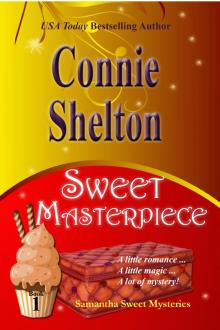 Sweet Masterpiece - The First Sweet’s Sweets Bakery Mystery
Sweet Masterpiece - The First Sweet’s Sweets Bakery Mystery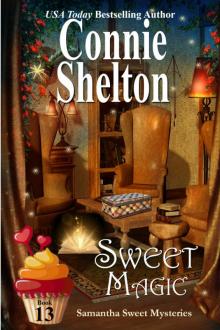 Sweet Magic
Sweet Magic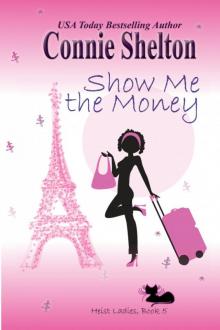 Show Me the Money
Show Me the Money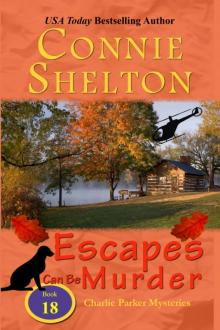 Escapes Can Be Murder
Escapes Can Be Murder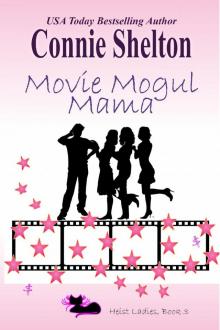 Movie Mogul Mama
Movie Mogul Mama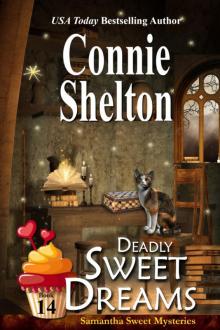 Deadly Sweet Dreams
Deadly Sweet Dreams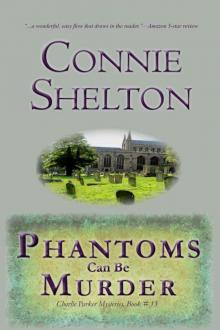 Phantoms Can Be Murder: Charlie Parker Mystery #13 (The Charlie Parker Mystery Series)
Phantoms Can Be Murder: Charlie Parker Mystery #13 (The Charlie Parker Mystery Series)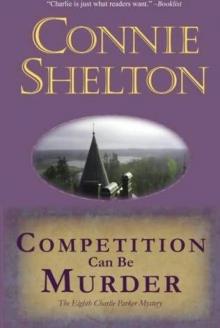 Competition Can Be Murder
Competition Can Be Murder Sweet Holidays: The Third Samantha Sweet Mystery (The Samantha Sweet Mysteries)
Sweet Holidays: The Third Samantha Sweet Mystery (The Samantha Sweet Mysteries)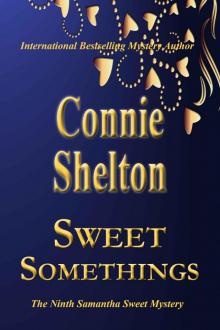 Sweet Somethings (Samantha Sweet Mysteries)
Sweet Somethings (Samantha Sweet Mysteries)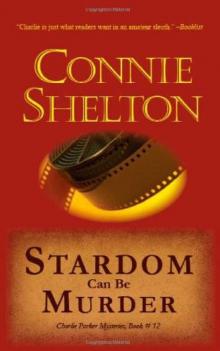 Stardom Can Be Murder: Charlie Parker Mystery #12
Stardom Can Be Murder: Charlie Parker Mystery #12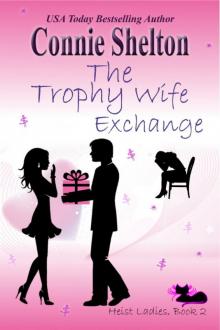 The Trophy Wife Exchange
The Trophy Wife Exchange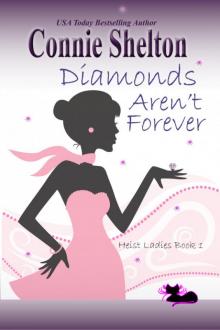 Diamonds Aren't Forever
Diamonds Aren't Forever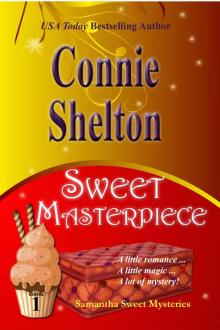 Sweet Masterpiece
Sweet Masterpiece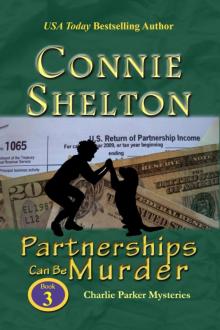 Partnerships Can Be Murder
Partnerships Can Be Murder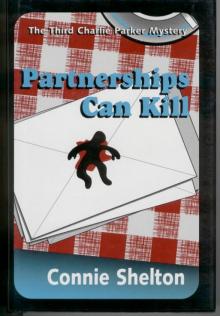 Partnerships Can Kill: The Third Charlie Parker Mystery
Partnerships Can Kill: The Third Charlie Parker Mystery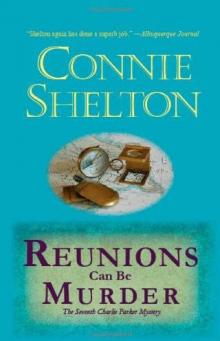 Reunions Can Be Murder: The Seventh Charlie Parker Mystery
Reunions Can Be Murder: The Seventh Charlie Parker Mystery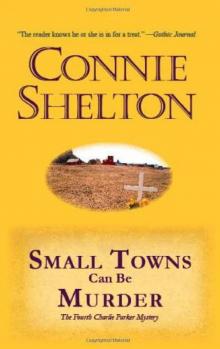 Small Towns Can Be Murder
Small Towns Can Be Murder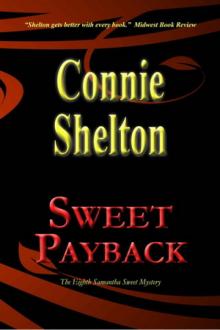 8 Sweet Payback
8 Sweet Payback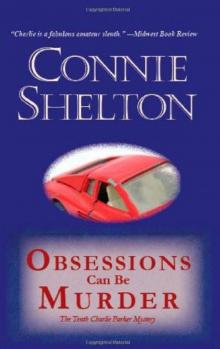 Obsessions Can Be Murder: The Tenth Charlie Parker Mystery
Obsessions Can Be Murder: The Tenth Charlie Parker Mystery 7 Sweets, Begorra
7 Sweets, Begorra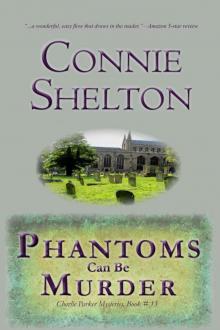 Phantoms Can Be Murder: Charlie Parker Mystery #13
Phantoms Can Be Murder: Charlie Parker Mystery #13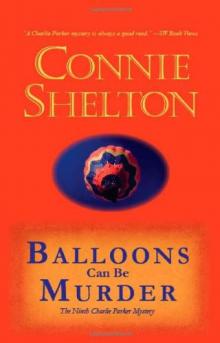 Balloons Can Be Murder: The Ninth Charlie Parker Mystery
Balloons Can Be Murder: The Ninth Charlie Parker Mystery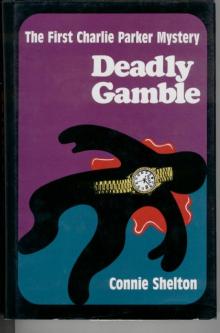 Deadly Gamble: The First Charlie Parker Mystery
Deadly Gamble: The First Charlie Parker Mystery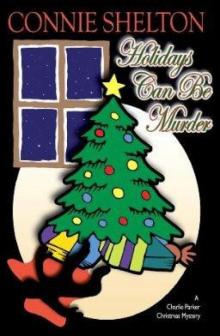 Holidays Can Be Murder: A Charlie Parker Christmas Mystery
Holidays Can Be Murder: A Charlie Parker Christmas Mystery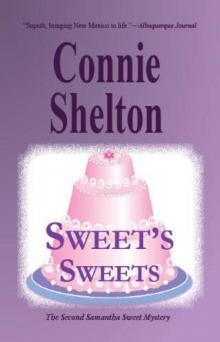 Sweet's Sweets: The Second Samantha Sweet Mystery ssm-2
Sweet's Sweets: The Second Samantha Sweet Mystery ssm-2 Sweet's Sweets: The Second Samantha Sweet Mystery (The Samantha Sweet Mysteries)
Sweet's Sweets: The Second Samantha Sweet Mystery (The Samantha Sweet Mysteries)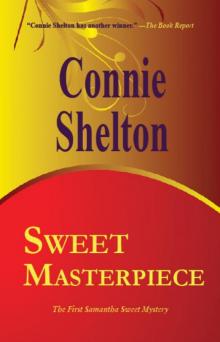 Sweet Masterpiece - The First Samantha Sweet Mystery
Sweet Masterpiece - The First Samantha Sweet Mystery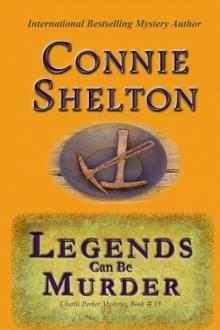 15 Legends Can Be Murder
15 Legends Can Be Murder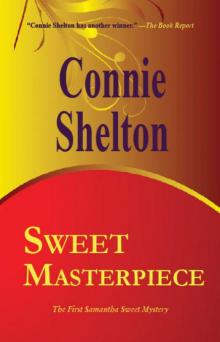 Sweet Masterpiece: The First Samantha Sweet Mystery ssm-1
Sweet Masterpiece: The First Samantha Sweet Mystery ssm-1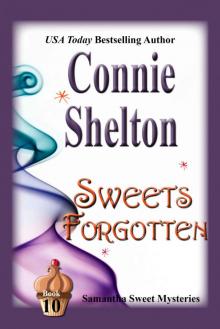 Sweets Forgotten (Samantha Sweet Mysteries Book 10)
Sweets Forgotten (Samantha Sweet Mysteries Book 10)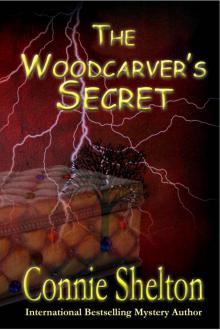 The Woodcarver's Secret (Samantha Sweet Mysteries)
The Woodcarver's Secret (Samantha Sweet Mysteries)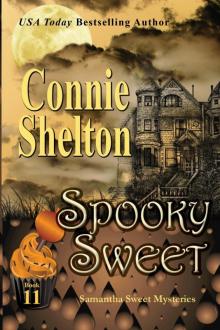 Spooky Sweet
Spooky Sweet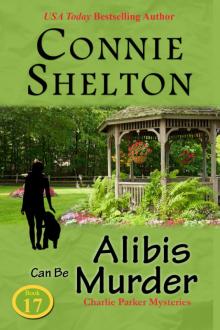 Alibis Can Be Murder
Alibis Can Be Murder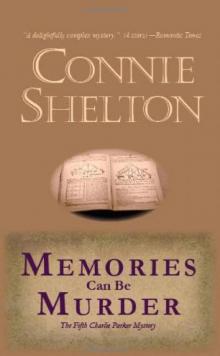 Memories Can Be Murder: The Fifth Charlie Parker Mystery
Memories Can Be Murder: The Fifth Charlie Parker Mystery Gossip Can Be Murder
Gossip Can Be Murder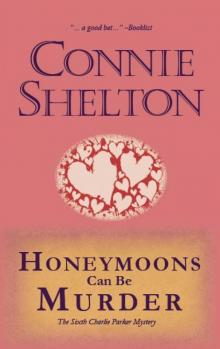 Honeymoons Can Be Murder: The Sixth Charlie Parker Mystery (The Charlie Parker Mysteries)
Honeymoons Can Be Murder: The Sixth Charlie Parker Mystery (The Charlie Parker Mysteries)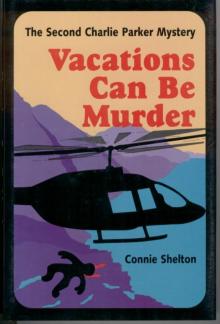 Vacations Can Be Murder: The Second Charlie Parker Mystery
Vacations Can Be Murder: The Second Charlie Parker Mystery Sticky Sweet
Sticky Sweet Sweet Hearts
Sweet Hearts